Columns
How $6.2m Stolen From CBN Within 24 Hours Was Shared
Published
10 months agoon
By
Ekwutos Blog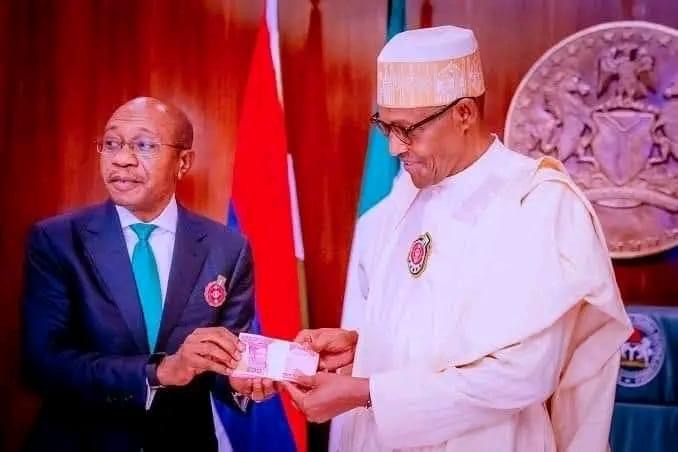
The sum of $6,230,000 allegedly stolen from the Central Bank of Nigeria (CBN), on February 8, 2023, was shared and invested into real estate, according to court documents.
The $6.2 million, according to the special presidential investigative team, led by Jim Obaze, that probed the tenure of the immediate past CBN Governor, Godwin Emefiele, was removed from the apex bank’s vault under the guise of paying election observers.
Emefiele is standing trial on an alleged 20-count amended charge, preferred against him by the Economic and Financial Crimes Commission (EFCC).
He was alleged to have engaged in criminal breach of trust, forgery, conspiracy to obtain by false pretence and obtaining money by false pretence when he served as central bank chief.
In the court documents, investigators described the theft as an insider’s job, allegedly effected by mainly, CBN officials with the connivance of two outsiders, identified as Adamu Abubakar and Imam Abubakar.
According to the documents, investigators claimed that Odoh Eric Ocheme, Emefiele’s personal assistant, received $3,730,000 of the funds, with three other people splitting the remaining $2,500,000.
Ocheme was said to have justified his lion’s share by claiming he had to pay other interests he had within the apex bank.
In one of the court documents, it was revealed that some of the beneficiaries invested their shares of the loot, estimated at about N1.4 billion in real estate, part of which has now been recovered.
In an affidavit filed along with an extradition charge pending against Adamu Abubakar, Imam Abubakar and Odoh Eric Ocheme before a Federal High Court in Abuja, one of the investigators, a Deputy Superintendent of Police, gave details of investigators’ findings and progress made so far.
Adamu Abubakar, Imam Abubakar and Ocheme are said to be at large and are believed to have fled the country.
This informed the initiation of extradition proceedings against them before the Federal High Court in Abuja.
The Deputy Superintendent of Police was quoted to have said: “We commenced investigation into the case and obtained copies of the withdrawal slip as well as the accompanying documents, Central Bank of Nigeria memos, dated 07/02/2023 and 31/01/2023 respectively, staff identity card of one Jibril Abubakar, letter dated 2/01/2023 purportedly written by Muhammadu Buhari to Boss Mustapha and letter dated 20/01/2023 purportedly written by Boss Mustapha to Mr Godwin Emafiele, which the Central Bank of Nigeria, Abuja Branch relied on in making the payment.
“Investigation at the office of the President as well as the Secretary to the Government of the Federation in the Stale House revealed that the letters purportedly written by Muhammadu Buhari and for Secretary to the Government of the Federation (SGF) Boss Mustapha did not emanate from the offices respectively, while Jibril Abubakar, whose identity card was used to cash the money in question is not a staff of the office of the Secretary to the Government of the Federation.
“We watched the Closed-Circuit Television (CCTV) footages of the 08/02/2023 being the day the money in question was cashed, and the payee (Jibril Abubakar) could not be identified by the staff of either the CBN or that of the office of the Secretary to the Government of the Federation, where he falsely represented himself to be working.
“A further study of the Closed-circuit Television (CCTV) footage revealed that a staff of the Abuja Branch of the Central Bank of Nigeria, identified as Abdulmajeed Muhammad received the impostor (Jibril Abubakar) at the gate of the bank when he arrived on the fateful date: 08/02/2023.
“Abdulmajeed Muhammad was consequently arrested and in his statement made on 15/12/2023, he admitted helping the impostor into the Abuja Branch of the Central Bank of Nigeria, but claimed that he did that innocently, the impostor having been referred to him by Bashirudeen Maishanu; a Senior Staff of the CBN.
“Abdulmajeed Muhammad further revealed that prior to 08/02/2023 when the impostor came to cash the money in question, he (Abdulmajeed Muhammad) had been invited by Bashirudeen Maishanu to explain the procedure of public officials making cash withdrawal from the CBN as those persons claimed to be officials from the office of the SGF and that the then president had approved certain fund for official assignment.
“We visited Kuje Correctional Centre, where we interviewed Godwin Emefiele, who purportedly approved the memos authorising the payment, as then CBN and he denied seeing, talk less of approving such memos.
“We also arrested some concerned staff of the Central Bank of Nigeria, who denied any involvement in the crime, before we finally arrested Bashirudeen Maishanu, who corroborated the account of Abdulmajeed Muhammad and further confessed to have been involved in the crime which, according to him was perpetrated by himself and the first to third defendants/respondents – Adamu Abubakar, Imam Abubakar and Odoh Eric Ocheme.
“Bashiru Maishanu further confessed that himself, the first and second defendants/respondents (Adamu Abubakar and Imam Abubakar) shared the sum of $2,500,000.00 from the stolen money, while the third defendant/respondent (Odoh Eric Ocheme), being a fellow staff of the Central Bank of Nigeria, kept the balance of $3,730,000.00 claiming that he had other interests to settle in the CBN.
“Bashirudeen Maishanu further confessed that both himself, and the first and second defendants/respondents jointly invested the United States dollars equivalent of the sum of N1, 440,000,000.00 into real estate business of Afrolyk Global Ltd.
“The Managing Director of the said Afrolyk Ltd, Aminu Lawal has been arrested and he confirmed the investment by Bashirudeen Maishanu, Adamu Abubakar and Imam Abubakar, and already refunded the sum of $200 000 00 to the Special Investigator’s team as part of the money he (Aminu Lawal) received as part of the purported investment.
“Cash of about $400,000 00 has also been voluntarily returned by Bashiru Maishanu from part of his remaining share of the money in question. The money (the $6,230,000) was received in cash from the Central Bank at Nigeria and also shared in the same cash by the defendants/respondents and others, making it difficult to trace the monies without arresting the defendants/respondents.
“It was later revealed that the third defendant – Odoh Eric Ocheme – was the Personal Assistant to Godwin Emefiele as the CBN governor while the first and second defendants (Adamu Abubakar and Imam Abubakar) are businessmen and associates of Bashirudeen Maishanu.”
You may like
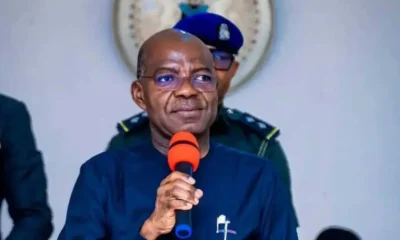

Otti orders investigation as Fire Service officials switch off phones during fire disaster in Aba


As a L£gally married w0man. Atanda, how long do i need to wait before getting married to another man L£gally in case if my husband kpai? I hope there will be no need for Div0rce again


Supreme Court: Abure’s sack will restore peace, order in LP – Otti


1984 riots: Court records statement of former chief of Delhi Sikh body against Jagdish Tytler
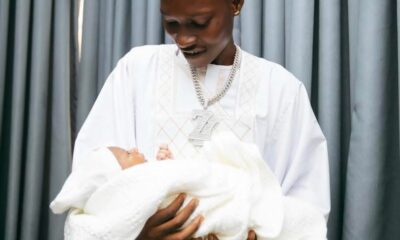

Zinoleesky Welcomes New Addition to His Family


Police Arrest Impostor In Uniform For Inciting Comment Against Edo People On Social Media
Columns
Afghan’s claim he is 140 years old is investigated by the Taliban
Published
19 hours agoon
April 4, 2025By
Ekwutos Blog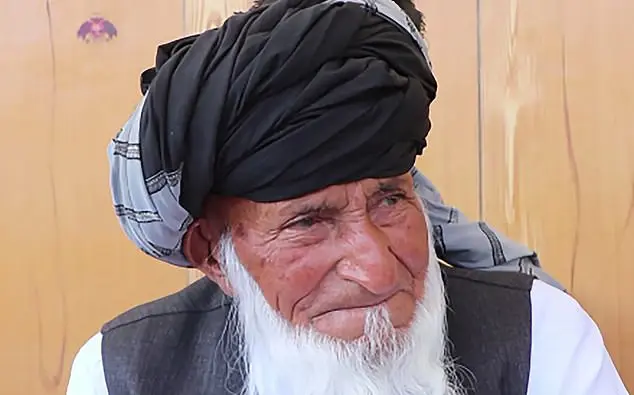
The Taliban is investigating an Afghan man’s claim that he is 140 years old – which would make him the oldest person ever to have lived.
Aqel Nazir, who lives in the country’s eastern Khost province, says he was born in the 1880s.
He claims to remember celebrating the end of the Third Anglo-Afghan War in 1919 alongside King Amanullah Khan, the Afghan leader who launched a campaign against the British, while in his thirties.
Nazir, who lives in the picturesque hills in Khost, said: ‘I was in the palace with King Amanullah Khan.
‘I was over 30 at the time and I remember saying that the British had fled and knelt down.
‘Everyone was happy and thanked King Amanullah Khan for chasing the British away.
‘Many leaders accompanied us to the Arg [presidential palace], but now all of them have passed away.’
The great-great grandfather does not have any documents to support his claim, but his family are also on board with gaining official recognition of his status.
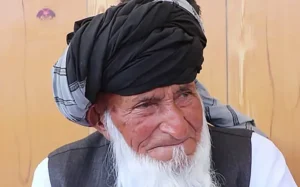
Aqel Nazir, who lives in the country’s eastern Khost province, says he was born in the 1880s

The ruling Taliban administration has dispatched a a special civil registration team to assess his true age
Khyal Wazir, his 50-year-old grandson, said: ‘He is my grandfather, and I have my grandchildren as well.’
Another grandson, Abdul Hakim Sabari, said: ‘We request the government confirm our grandfather’s age using an ID or any other scientific method or documents, to prove he is 140 years old.’
In an attempt to solve the mystery, the ruling Taliban administration has dispatched a a special civil registration team to assess his true age.
Mustaghfar Gurbaz, a Taliban spokesman for the province, said: ‘If confirmed by documents or assessments, we will work to register him as the oldest person in the world.’
If verified, he would comfortably take the title of the oldest person to have ever lived.
That record is held by Jeanne Calment, who was born in 1875 and passed away in 1997, 122 years later.
The world’s current verified oldest living person is Inah Canabarro Lucas, a Brazilian nun who turned 116 last June.
Another Brazilian woman, Deolira Gliceria Pedro da Silva, is hoping to have her own claim to be 120 years of age verified by Guinness World Records.
But experts have already cast doubt on Nazir’s claims.
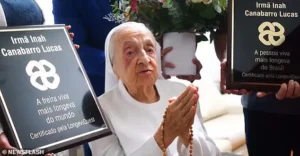
The world’s current verified oldest living person is Inah Canabarro Lucas
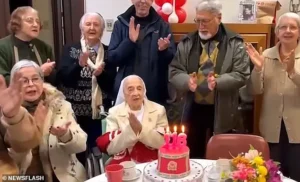
The Brazilian nun turned 116 last June
Valery Novoselov, a geriatrician at Moscow State University, told Russian outlet AIF: ‘There are no reliably registered men on the planet older than 114 to 115 years [of age].
‘In the Caucasus in the 60s, they also recorded “long-livers” – shepherds who allegedly lived to 168 years.
‘These are so-called games with age. There are no documents, no reliable data – which means this is an unrealistic picture.’
In 2015, a man claiming to be 100 years old applied for asylum in Germany after an extraordinary eight-month journey from Afghanistan.
Like Nazir, Abdul Qadir Azizi did not have any identity papers, but his family claimed his year of birth was 1905.
Azizi, who is deaf and blind, spent one month travelling across two continents from his home in the Afghan town of Baghlan to reach Germany.
His family fled after three of Azizi’s sons were killed by the Taliban.
The plight of the elderly in Afghanistan has worsened since the Taliban takeover.
In 2024, they effectively abolished the pension system, leaving many older Afghans struggling to meet basic needs.
Previously, anyone over the age of 65 received a monthly payment of around $100 from the state.
Columns
Tourists lament cancellation of 2025 Eid-el-Fitr Durbar in Kano
Published
20 hours agoon
April 4, 2025By
Ekwutos Blog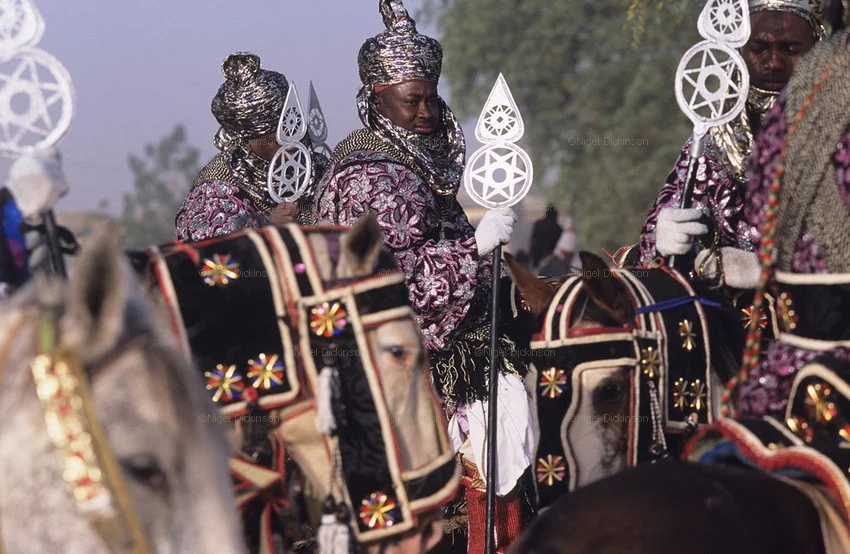
Several tourists have expressed disappointment over the abrupt cancellation of the 2025 Eid-el-Fitr Durbar, a popular traditional horse-riding festival, in Kano State.
More than 160 tourists had traveled to Kano to witness the annual Sallah Durbar, which is renowned for its grandeur and cultural significance. The cancellation, announced shortly before the event, left many visitors disheartened.
Speaking at a press briefing in Kano, Mr. Virgil Taylor, a tourist from the United States who spent a year planning his trip, described the experience as disheartening. He arrived in Nigeria on March 28, 2025, only to learn of the Durbar’s cancellation.
“Kano Durbar, as I understood from my research, was the biggest Durbar to visit. I only learned that the Durbar was canceled when I arrived in Kano. I was terribly disappointed because I had made significant financial commitments to the trip, arranging everything in advance,” Taylor said.
The first-time visitor to Nigeria noted that the Durbar represented a unique and historic opportunity for him, one he had long anticipated. Despite the setback, he appreciated the efforts of the Executive Secretary of the Kano State History and Culture Bureau, Mr. Ahmad Yusuf, and Governor Abba Kabir Yusuf, for providing alternative experiences for tourists.
Taylor, however, urged the Federal Government to minimize the issuance of security threats that could deter investors and tourists from visiting Nigeria. “Despite the financial cost, I consider my visit a blessing and would consider returning, hoping not to be disappointed again,” he added.
Similarly, Lekan Yusha’u, a UK-based Nigerian and polo agent, expressed frustration over the cancellation. He noted that his visit, along with the invitation extended to his friends, was largely inspired by UNESCO’s recognition of the Durbar as part of its heritage program.
“They have never ridden a horse in such a long procession. My goal, along with a couple of friends, was to ensure that within the next year, we put the Kano Durbar procession in the Guinness World Records. Kano Durbar has the largest gathering of horses in the world, with over 4,000 horses participating in a single procession,” Yusha’u said.
He revealed that he had spent over £6,000 on his flight alone, excluding other expenses, and had met over 160 foreign tourists who had come for the same event.
Yusha’u urged the Kano State Government to capitalize on the event’s global appeal, emphasizing that the Kano Durbar is unique to northern Nigeria.
“Both the state and federal government should not disappoint us again by canceling the Kano Durbar,” he said.
The annual Durbar festival in Kano is a cultural showcase that attracts visitors from around the world, featuring colorful horse parades, traditional dances, and displays of local heritage.
Columns
I got married to man who wasn’t financially sound – Michelle Obama admits
Published
2 days agoon
April 3, 2025By
Ekwutos Blog
Former U.S. First Lady Michelle Obama has admitted that Barack Obama was “not financially sound” when she met him.
The couple met in 1988 when Barack took a job at a law firm in Chicago where Michelle was already working.
Speaking on the podcast she hosts with her brother, Craig, Michelle spent much of their most recent episode discussing the importance of having a partner with financial stability.
Talking with British author Jay Shetty, Craig put the question directly to his famous sister.
He asked, “Would you be attracted to a guy who’s not financially sound when you meet him?”
Michelle immediately responded, “Uh, I married one.”
Craig then laughed and admitted to his sister that he’d set her up.
“Don’t you like that alley-oop I just threw you? In basketball, you just point—you don’t even have to say it,” he said.

Otti orders investigation as Fire Service officials switch off phones during fire disaster in Aba

As a L£gally married w0man. Atanda, how long do i need to wait before getting married to another man L£gally in case if my husband kpai? I hope there will be no need for Div0rce again

Supreme Court: Abure’s sack will restore peace, order in LP – Otti
Trending

 Trending5 months ago
Trending5 months agoNYA demands release of ‘abducted’ Imo chairman, preaches good governance
- Business6 months ago
US court acquits Air Peace boss, slams Mayfield $4000 fine

 Politics5 months ago
Politics5 months agoMexico’s new president causes concern just weeks before the US elections
- Entertainment5 months ago
Bobrisky transferred from Immigration to FCID, spends night behind bars
- Entertainment5 months ago
Bobrisky falls ill in police custody, rushed to hospital

 Politics5 months ago
Politics5 months agoRussia bans imports of agro-products from Kazakhstan after refusal to join BRICS

 Politics5 months ago
Politics5 months agoPutin invites 20 world leaders
- Politics1 year ago
Nigerian Senate passes Bill seeking the establishment of the South East Development Commission.

